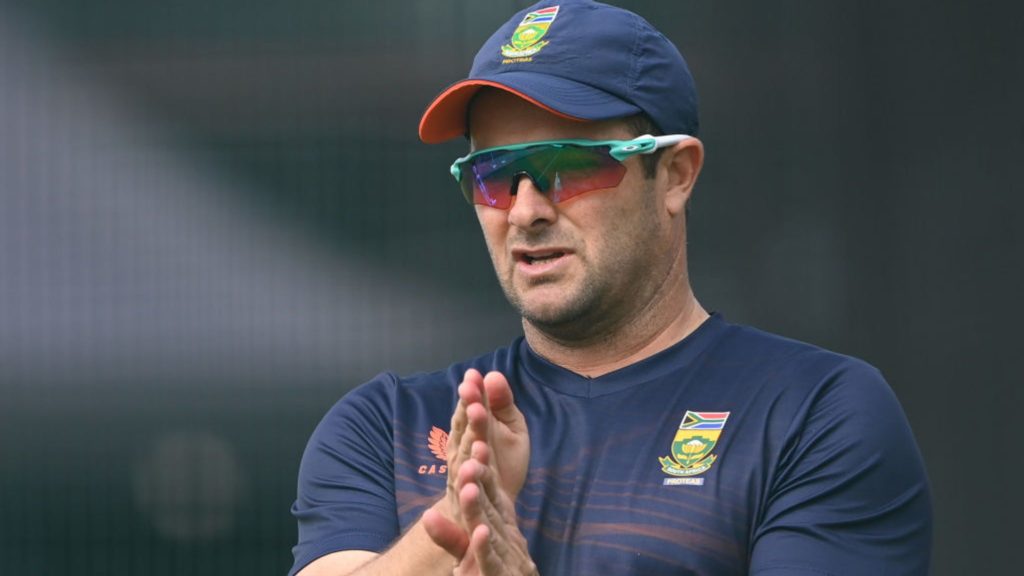Outgoing Proteas head coach Mark Boucher can salvage an otherwise ordinary record across all formats if he wins the T20 World Cup. But what state does he leave the team in, asks RYAN VREDE?
This week Boucher announced that he wouldn’t continue after the T20 World Cup in Australia. It caught Cricket South Africa off guard, with CEO Pholetsi Moseki saying: “To be honest, we were expecting him to be around until the ODI World Cup in India next year. When he engaged with us, it was quite a shock in that sense. You can’t begrudge him for wanting to pursue other opportunities like he said he wanted. At least we agreed that he finishes after the T20 World Cup in Australia.”
Boucher has since been confirmed as the Mumbai Indians head coach.
His immediate focus will be the T20 World Cup, a competition that, if he wins it, will enhance his legacy. Given a history marked by mediocrity at ICC tournaments, Boucher would leave a hero if he broke the duck.
However, another failure at a showpiece tournament and Boucher’s tenure will be appraised as distinctly average. His 67% win percentage in ODI cricket is solid, but that dips to 55% and 53% in Test and T20I cricket respectively. The latter two are the primary measure of a head coach in the game.
Boucher’s Test record is padded by two wins each against weak Sri Lanka and Bangladesh sides, but he did beat World Test Championship (WTC) finalists, India, and drew against the reigning Test champions, New Zealand.
Notably, Boucher took the Proteas to the top of the WTC standings (they dropped to second after the England series defeat) and has given them a chance of contesting the WTC final.
However, he leaves a Test team with deep struggles in their batting. They were dismissed for under 200 in their last four innings, reopening a wound that has struggled to heal throughout Boucher’s tenure in Test cricket.
His successor will inherit this problem, and with a lack of experience and/or dreadful form defining the current line-up, as well as a distinct lack of tactical identity, that remedial job should be his primary focus.
The Proteas’ bowling attack is among Test cricket’s elite, evidenced by their performances against India, New Zealand and England when their cause has been supported by competent batting. There have been significant strides forward in the ODI and T20I formats as well.
Boucher has publicly lamented their batting struggles, but he and his coaching team have failed to find answers to their most pressing batting questions.
In Test cricket, the gifted Aiden Markram has regressed under their watch, as has Wiaan Mulder. Kyle Verrynne, who averages nearly 50 in first-class cricket, has not been able to translate his obvious talent into consistent performances through 18 innings, while rookies like Sarel Erwee and Keegan Petersen have drifted between the sublime and ordinary.
This is a coaching issue in equal measure as it is one of a player taking personal responsibility for their performances. The solutions aren’t obvious either, and Boucher’s successor faces an unforgiving welcome against Australia in Australia for his first Test series.
“I always bank on experience. I know we don’t have that at the Test level. My next best thing is, who do we have in first-class cricket back home, but is that the right solution? We don’t know yet,” skipper Dean Elgar said in the wake of the series defeat against England.
“We’ve still got a few months before our next series and we’ve only got a handful of four-day games at home before we leave to Australia. It’s a tough thing now, because the guys have to learn the toughest format without a lot of experienced heads around them, which is always something we were aware of. But those are the cards we’ve been dealt and we’ve got to find a way to ease the blow.”
Elite coaches are known to measure their success by whether they leave the team in a better state than they got it. Boucher has done so in ODI cricket, and there is a clear upward trajectory in T20s.
If he manages to win the T20 World Cup, Boucher’s average record will be forgotten, and the challenges that lay ahead of his successor will seem brand new and without historical context.







